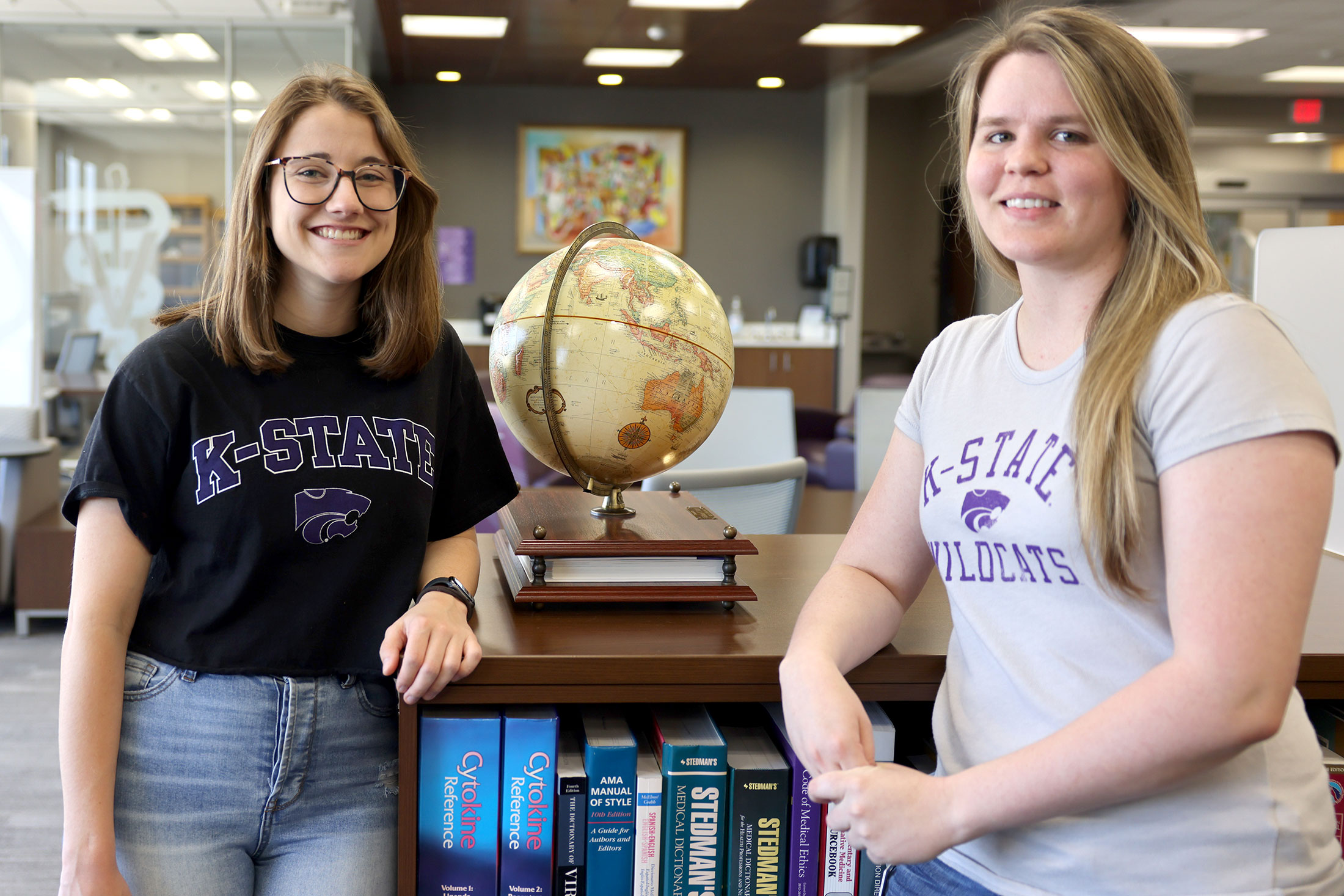April 11, 2023
One-year master's program in biomedical science prepares students for professional schools
 |
One-year master's students in biomedical science Hailey Weaver, left, and Marquette Stanley have been accepted into K-State's Doctor of Veterinary Medicine degree program. Photo by Audrey Hambright, College of Veterinary Medicine marketing and communications. |
Thanks to Kansas State University's one-year master's degree program in biomedical science, a broad mix of students are finding their way from the College of Veterinary Medicine to professional schools with a variety of advanced curriculums.
"After analyzing our numbers from the past two years, we are thrilled that 96% of our one-year master's graduates matriculate to either a D.V.M., M.D., D.D.S. or Ph.D. program," said Hans Coetzee, university distinguished professor and head of the anatomy and physiology department.
The biomedical science master's can be completed in one year, as opposed to typical master's programs, which usually take about two years.
"Often students are not sure what their future holds," said Matthew Basel, clinical assistant professor and associate director of the program. "The pre-professional one-year master's program is designed to introduce students to the biomedical field and prepare them for professional school. During the program, students are able to take advanced courses in a wide range of biomedical sciences, including anatomy, physiology, histology and pharmacology."
The pre-professional one-year master's program in biomedical science is a non-thesis, coursework-based master's degree designed to be completed in 12 months. The program starts during the summer session and is completed at the end of the following spring semester. The 2023 program begins May 22. Applications for summer admission are being accepted through May 1.
"The switch from undergraduate courses to professional courses can be difficult and intimidating," said Hailey Weaver, current student in the program from Fletcher, Ohio. "In one year, I was able to improve as a student and become confident in my abilities to succeed in professional school. Within this program I gained a better understanding of anatomy and physiology and had the opportunity to strengthen my study habits."
Another student in the program, Marquette Stanley, Duncanville, Texas, said, "As a student who hadn't been in the classroom for a few years, I found the master's program to be very beneficial in building confidence in getting back into the classroom. The professors are very approachable, and although the information is challenging, it is presented in a way that makes it easier to understand and apply."
In addition to Basel, program coordinators include Pradeep Malreddy, clinical associate professor of anatomy and physiology, and Peying Fong, associate professor of physiology.
"There are no specific admission requirements for this program, as we would like to serve a wide range of potential students," said Malreddy. "We do have some suggested guidelines for students that we think will help them be more likely to succeed. We recommend a bachelor's degree in a biomedical science-related field, a minimum 2.8 or higher overall grade-point average and at least a 3.0 grade-point average in their higher-level science courses or the last 45 hours of bachelor's degree studies."
All students earning a master's degree at K-State must complete a culminating experience that will be determined by the student in concert with his or her graduate committee. Culminating experiences include either an intellectually creative project, a final report or a culminating examination.
"We believe the best place to prepare for professional school is at a professional school where students can interact with professors who understand the program," said Basel. "Students take courses designed to have the same rigor as any other professional health school and have access to world-class facilities. Classes begin in the summer semester with an intensive introduction to anatomy and physiology, followed by a mix of required and elective courses in the fall and spring."
While the current class nears graduation in May, the program is currently taking applications for the next school year. Classes are scheduled to start in May. Applications are made through the Graduate School at K-State, while the one-year master's program in biomedical science is administered through the College of Veterinary Medicine.
For a full description of the program, the admission requirements and application procedures, visit the program's website.
